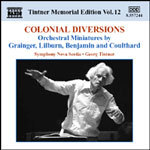
Colonial Diversions (Lilburn, Grainger, Dreyfus, Benjamin, Coulthard)
 $25.00
Out of Stock
$25.00
Out of Stock6+ weeks add to cart
Colonial Diversions (Lilburn, Grainger, Dreyfus, Benjamin, Coulthard)
Symphony Nova Scotia; Georg Tintner, conductor
[ Naxos Titner Memorial Edition 12 / CD ]
Release Date: Monday 1 November 2004
This item is currently out of stock. It may take 6 or more weeks to obtain from when you place your order as this is a specialist product.
Georg Tintner was born in Vienna in 1917. He began studying piano at the age of six and to compose soon after. From nine to thirteen he was a member of the Vienna Boys Choir, where he also conducted the choir in performances of his own compositions. At thirteen he entered the Vienna State Academy as a composition prodigy, studying composition with Josef Marx and conducting with Felix Weingartner.
Percy Grainger (1892-1961) was a great eccentric. He was a practitioner of flagellation (his whips are discreetly displayed in the Grainger Museum in his native Melbourne), he believed in Nordic Supremacy, and was suspected of having an incestuous relationship with his domineering, syphilitic mother. None of this, however, prevented his becoming one of the leading concert pianists of his time, admired and befriended by both Grieg and Delius. He was a writer, editor, pedagogue, a tireless collector of folksongs, and a talented composer of light music. In his native country he is revered (and somewhat overrated) as Australia's only world-famous composer before the present generation.
Grainger was at his best as a miniaturist. The works on this recording are good examples: charming tunes, masterfully orchestrated. Though Grainger hardly saw Australia again after he left at nineteen, the country often appears in his music. The Gum-suckers' March refers to people from the state of Victoria, a nickname for those who chew eucalyptus (gum) leaves on a hot day for their refreshing volatile oils. Eastern Intermezzo reminisces about Grainger's childhood visits to Melbourne's Chinatown. The Colonial Song is a patriotic post-Federation (1901) piece, somewhat burdened with an overblown God-and-King treatment but superbly crafted. It is this quality, and Grainger's ability to turn a catchy tune that has allowed his somewhat parlour-style music to withstand the test of time.
Douglas Lilburn (1915-2001) is unquestionably New Zealand's most important composer, and in Georg Tintner's opinion, the finest from either country. A farmer's son, he was talented in both music and literature, but decided for music in 1936 when Grainger awarded him the Grainger Prize for one of his compositions. He went to London in 1937 and studied with Vaughan Williams. A fervent New Zealander, he returned in 1940, and eventually became Professor of Music at Wellington's Victoria University.
Lilburn's music, which includes three symphonies, shows the influence of Vaughan Williams and to a lesser extent Sibelius, but it is not at all derivative. The voice is uniquely Lilburn's; it speaks movingly of the New Zealand landscape, beautiful and austere. Diversions for Strings was written in 1947 for the Australasian tour of the Boyd Neel Orchestra. Its five short movements are direct in style and form, and with alternating moods the composer describes respectively as "Light, nostalgic, satirical, sentimental, and tossed-off." The fourth movement description, however, should be taken to mean full of sentiment, for it is a profound and beautiful movement not in any way superficial.
George Dreyfus was born in Wuppertal, Germany, in 1928 and went to Australia as a refugee in 1939 - young enough to have absorbed some of the laconic Australian character. It may be the comfortable blending of two such disparate cultures that has made Dreyfus such a successful composer of everything from opera and symphony to film music and advertising jingles. He is also one of the few contemporary composers to express a genuine sense of humour in his music.
Dreyfus had in fact no formal training as a composer, though he was a professional bassoonist until 1965. The Serenade for Small Orchestra, originally titled Music for Music Camp, was written in 1967 for the various annual music camps in Australia. It was Dreyfus's first orchestral work, but it already displays a complete command of orchestration and the usual fine wit. Dreyfus himself describes the music as "of instant appeal, lighthearted and melodious, something that youngsters enjoy rehearsing and performing."
Arthur Benjamin (1893-1960) grew up in Australia but, like Grainger, spent most of his career abroad as a concert pianist, composer and conductor. Like Dreyfus he wrote all types of music from opera to film scores; his best-known work is the Jamaican Rumba. All of his music is colourful and beautifully crafted, as North American Square Dance shows, with its skilful use of fiddle tunes from the United States and Canada.
Benjamin lived mostly in England, but he spent the war years on the west coast of Canada, where in 1938 he met the young Vancouver composer Jean Coulthard (1908-2000). Though Coulthard had, like Lilburn, studied with the great symphonist Vaughan Williams, she had until then only written for voice and piano. Coulthard says, "I really feel indebted to Benjamin for starting me off on my 'orchestral career' ... He encouraged one to write in one's own way, of course." Many of Coulthard's works, including her Excursion Ballet Suite, were premiered in Vancouver at Benjamin's highly successful Prom Concerts, with Benjamin himself conducting.
Coulthard describes the suite as being inspired by "... a joyous youthful experience! ... a scene so very familiar to Western Canadians before the war years when the ferry boats called at all the vacation islands in the Gulf of Georgia."
Tracks:
PERCY GRAINGER
Youthful Suite
Colonial Song
In a Nutshell Suite
DOUGLAS LILBURN
Diversions for Strings
GEORGE DREYFUS
Serenade for Small Orchestra
ARTHUR BENJAMIN
North American Square Dance
JEAN COULTHARD
Excursion Ballet Suite
